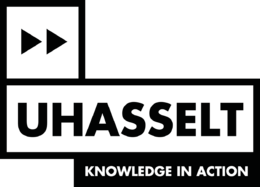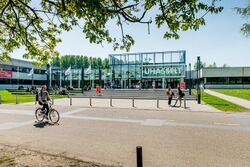Organization:University of Hasselt
 | |
| Motto | 'Knowledge in Action' |
|---|---|
| Established | 1971 (UHasselt since 2005) |
| Budget | 89.6 million euro (2016) |
| Rector | Luc De Schepper (2004 - now) |
Administrative staff | ± 1,296 (2017) |
| Students | |
| Location | Hasselt , |
| Campus | Diepenbeek and Hasselt |
| Black|u}}rs | Black |
| Nickname | UHasselt |
| Website | www.uhasselt.be |
Hasselt University (Dutch: Universiteit Hasselt) is a university with campuses in Hasselt and Diepenbeek, Belgium. It was officially established in 1971, as the Limburgs Universitair Centrum (LUC). On June 15, 2005 the university changed its name to Hasselt University.
Currently, the universities of Hasselt and Maastricht work together as the Transnational University Limburg (tUL). Together with Hogeschool PXL, it established the Limburg Association of Higher Education (AUHL).
The rector of the university currently is Prof. Luc de Schepper, the vice rectors are Prof. Karin Coninx and Prof. Jean-Michel Rigo.
History
Hasselt University was officially established in 1971 as ‘Limburgs Universitair Centrum’ (LUC), but it was not until 1973 that the university – literally – opened its doors and welcomed its first students. Until 1991 the university was, in fact, an undergraduate level university institution with two faculties: the Faculty of Medicine-Dentistry and the Faculty of Sciences (with study programmes in Mathematics, Physics, Computer Science, Chemistry and Biology). In 1991 the university expanded the reach of its curriculum by transforming the Limburg Business School (Economische Hogeschool Limburg), an independent university college which was located on the same campus in Diepenbeek, into the Faculty of Applied Economics. At the same time, Hasselt University became entitled to organize postgraduate programmes and award doctoral degrees in its three faculties.
International collaborations
In 2001 the Flemish and Dutch Ministers of Education signed an International Treaty by which the transnational University Limburg (tUL) was founded. Academic staff from Hasselt University and from nearby Maastricht University (in the Dutch Province of Limburg) since then jointly undertake research activities and offer degree programmes in Life Sciences and Computer Sciences.
Limburg Association of Higher Education
In 2002 Hasselt University, together with Hogeschool PXL established the Limburg Association of Higher Education (AUHL). The AUHL was founded to enhance cooperation between higher education institutions in the region.
New city campus
In the past decade Hasselt University has expanded its curriculum thoroughly. Since September 2004,the university offers a unique programme (bachelor and master) in Transportation Sciences. A bachelor programme in Law was established in September 2008, in cooperation with Maastricht University and KU Leuven. Three years later a master programme in Law was created.
2012 proved to be a new milestone in the university’s young existence, with the inauguration of the ‘city campus’ in Hasselt.
Higher education reform
In September 2013 four new (bachelor and master) programmes were added to the university’s curriculum: Architecture, Interior Design, Rehabilitation Sciences & Physiotherapy and Industrial Sciences. This expansion also entailed the creation of two new faculties: the Faculty of Architecture & Arts and the Faculty of Engineering Technology. That brings the total number of faculties to six, alongside the Faculty of Business Economics, Faculty of Medicine & Life Sciences, Faculty of Sciences and the Faculty of Law. In 2014, the School of Transportation Sciences was established.
Hasselt University is home to about 6,000 students and 1,200 academic, administrative and technical staff members.
Campuses
Campus Hasselt
The head office of Hasselt University is located at campus Hasselt. The complex consists of three buildings, located near each other: the Vice Chancellor’s Office Building, the Faculty of Law and the ‘Oude Gevangenis’ (the renovated ‘Old City Jail’). The former city prison provides a new home to primarily law students, with several study rooms and two auditoriums. The Student Service Center, where enrollment of new students takes place, is also located in the ‘Oude Gevangenis’.
Campus Diepenbeek
Since 1973 Hasselt University is located on the Campus Diepenbeek, which occupies a 75-acre site. Moreover, several institutes for applied research, an incubator for starting small enterprises, and several small businesses interacting with the research activities of the university are located on campus Diepenbeek. Building D includes the agora, the student restaurant and the library.
Programmes
| Faculty | Bachelor's programmes | Master's programmes |
|---|---|---|
| Faculty of Medicine and Life Sciences |
|
|
| Faculty of Sciences |
|
|
| Faculty of Engineering Technology |
|
|
| Faculty of Business Economics |
|
|
| Faculty of Law |
|
|
| Faculty of Architecture and Arts |
|
|
| School for Transportation Sciences |
|
|
Figures
Student population:[1]
- 2008-2009: 2,628 students
- 2009-2010: 2,886 students
- 2010-2011: 3,084 students
- 2011-2012: 3,310 students
- 2013-2014: 5,500 students
In 2016, 15% fewer students enrolled for the new academic year, with just 1,250 freshmen starting.[2]
Staff population: On February 1, 2014, 1,100 staff members were employed at Hasselt University.[3]
Institutes
Hasselt University has six research institutes:
- BIOMED - Biomedical Research Institute
- CenStat - Centre for Statistics
- CMK - Centre for Environmental Sciences
- EDM - Expertise Centre for Digital Media
- IMO - Institute for Material Research
- IMOB - Transportation Research Institute
Student organisations
The most important student organisation is the Student Council or StuRa. This body of 14 elected students makes sure the student's rights are respected in every way. The chairman also has a seat in the university's Board of Governors.
Other student organisations at Hasselt University are:
- ESN Hasselt (Erasmus student network)
- AIESEC (Association Internationale des Etudiants en Sciences Economiques et Commerciales) http://www.aieseclimburg.be
- Junior Consulting (A student consultancy organisation)
- Dip's (For students biology and chemistry) http://www.dips.be
- Filii Lamberti (For students mathematics, physics and CS) http://www.filii.be
- Miezerik (For medicine students) http://miezerik.luc.ac.be
- Biomedica (For students biomedical sciences) http://biomedica.uhasselt.be
- Hermes (For students economy) http://www.hermesdiepenbeek.be/
- Commeatus A new organisation for students who study transport studies. http://www.commeatus.be (Site in Dutch only)
- CCG (Christelijke Campus Gemeenschap; Christian Campus Society) http://www.ccgdiepenbeek.be
- VLUG (Vrijzinnig Limburgs Universitair Genootschap ; Secular Limburgish University Society)
Honorary Degrees
Over the past four decades, Hasselt University has bestowed 66 honorary degrees. In 2013, Martin Cooper - also known as 'father of the mobile phone' - joined the UHasselt Honorary Doctors. He was nominated by the Student Council.
Honorary Doctors Hasselt University
- Morten Bennedsen
- Mariana Mazzucato
- Stijn Bijnens
- Martha Nussbaum
- Jean-Marie Tarascon
- Paul Stoffels
- Kunlé Adeyemi
- John Lloyd Provis
- Emmanuel de Merode
- Richard D. Bardgett
- Jeremy Rifkin
- Thomas Friedman
- S. Tamer Cavusgil
- Christine Van Broeckhoven
- Bijoy Jain
- Luc Deleu
- Henry Chesbrough
- Lieven Maesschalck
- Michael Braungart
- Heinz Klug
- Richard Friend
- Jean-Jacques Cassiman
- John G. F. Cleland
- Silvana Sciarra
- Wil van der Aalst
- Ramesh Raskar
- Johny Vansevenant
- Mahmoud F. Fathalla
- Marc Bossuyt
- Monder Ram
- Bernardo Secchi
- Ignace Schops
- Andrew B. Holmes
- Richard E. Palmer
- Koen Vanmechelen
- Michael Rowe
- Panamarenko
- Robert Mendelsohn
- Michael Grätzel
- Susan Trumbore
- Alain Hubert
- Ingrid Daubechies
- Piet Lemstra
- Lawrence Steinman
- Alan Thompson
- Baruch Lev
- Gerard Unger
- Shalom Hakkert
- Christopher Alexander
- Axelle Red
- Polly Matzinger
- Cees Dekker
- Kathleen Eisenhardt
- Frank De Winne
- Tom Jovin
- Yuri Gurevich
- David Montgomery
- Michael Berridge
- Harold Kroto
- Roger Langenaken
- David Cox
- Erwin Neher
- Hans Mohr
- Georges Köhler
See also
- Science and technology in Flanders
- Limburg Science Park
- University Foundation
- Flanders Interuniversity Institute of Biotechnology (VIB)
- Interuniversity Microelectronics Centre (IMEC)
External links
| Wikimedia Commons has media related to Hasselt University. |
- Hasselt University
- More information about higher education in Flanders/Belgium (in English)
- Find an officially recognised programme of this institution in the Higher Education Register
- ↑ http://www.uhasselt.be/UH/OverUHasselt/feiten-en-cijfers/Richtcijfers/Cijfers-rond-onderwijs.html
- ↑ http://www.hbvl.be/cnt/dmf20160919_02475239/200-minder-inschrijvingen-aan-uhasselt-na-gehypete-opleidingen
- ↑ http://www.uhasselt.be/UH/OverUHasselt/feiten-en-cijfers/Richtcijfers/Cijfers-rond-personeel.html
[ ⚑ ] 50°55′31″N 05°23′27″E / 50.92528°N 5.39083°E





